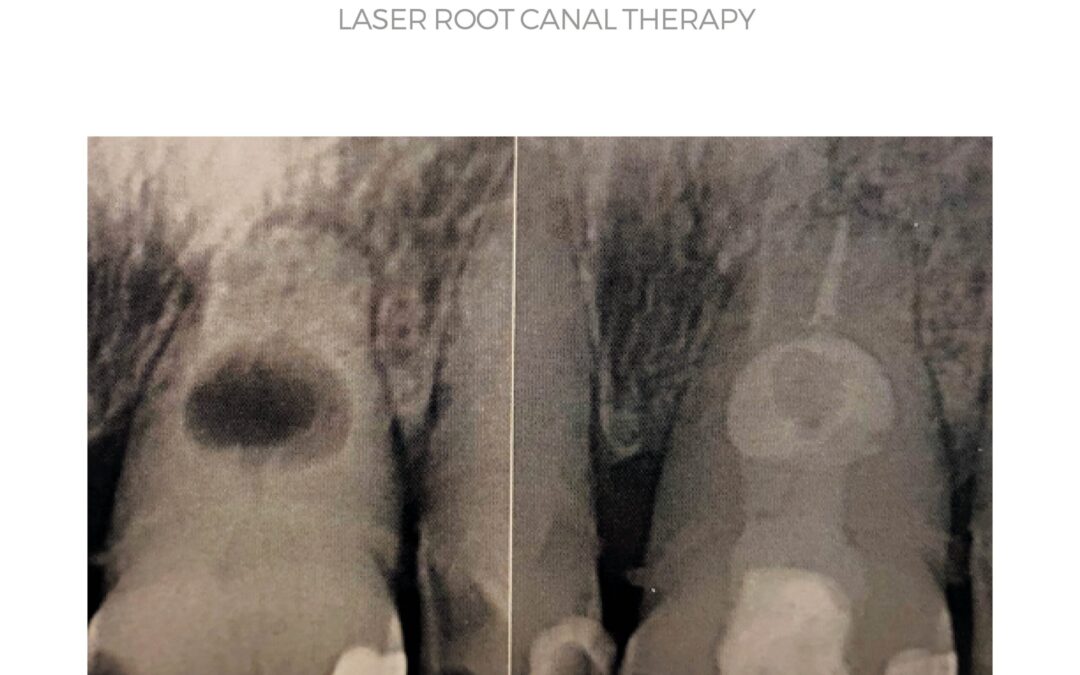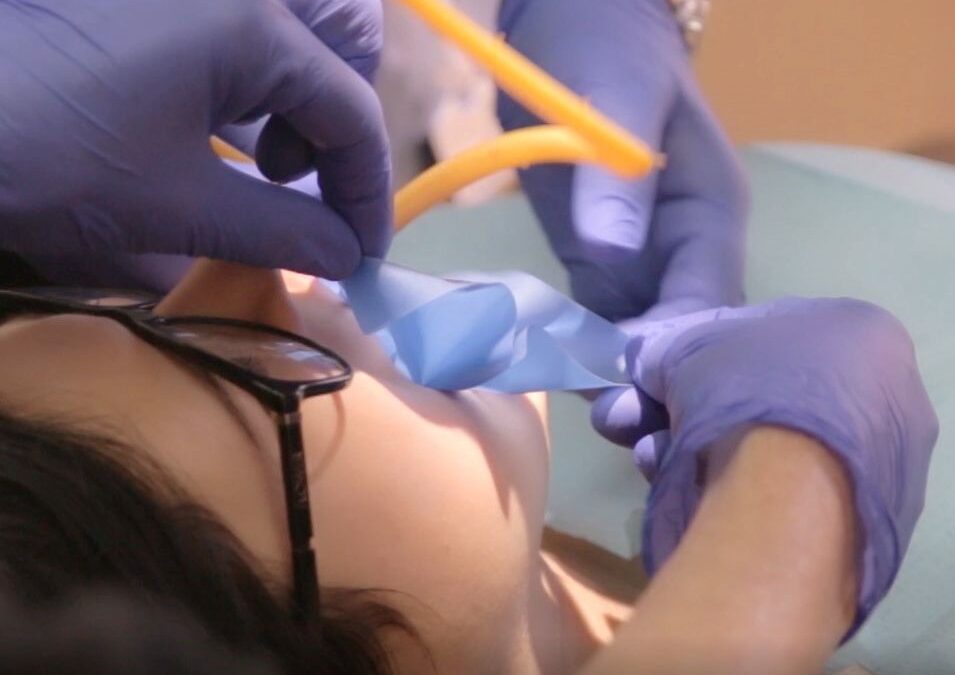
by Dr. Jacqueline S. Allen | Aug 19, 2022 | Blog, Endodontics, Endodontist, Phoenix Endodontic Group, Root Canal
Patients often ask our staff at Phoenix Endodontic Group questions about their root canals looking to better understand what they will experience. Many people are concerned about the severity of the procedure or how much recovery time to plan for.
The good news is that many root canals have a quick recovery time – often just a week of special post-operative care. Many factors can impact your individual outcome, though, so it is important to understand the circumstances that brought you to the endodontist in the first place. Here’s a short list of some situations that can make the root canal procedure itself or your post-op period require extra care to ensure the root canal is successful.
 What Makes A Root Canal A Serious Procedure?
What Makes A Root Canal A Serious Procedure?
-
When there is pre-existing infection or tooth damage. A crack or chip can let infection deep into a tooth’s pulp. Extensive tooth decay can also reach the pulp. If the infection causes an abscess, antibiotics may be needed first to eliminate the bacteria so the root canal can safely seal the roots so infection does not happen again.
-
When the tooth involved has multiple roots. The level of complexity involved with cleaning and sealing canals during a root canal increases with the number of canals in the tooth receiving treatment. Molars have up to four canals; premolars have one or two; canines and incisors have just a single canal.
-
When you don’t contact your endodontist if you have aftercare problems. An ordinary root canal can escalate quickly to challenging if you do not promptly call your endodontist when you experience pain that is severe or rapidly increasing; if the temporary filling placed in the tooth comes out; or if you can see swelling inside or outside of your mouth.
-
When you don’t return for your permanent crown as scheduled. The tooth being treated with a root canal should receive a permanent crown about two weeks after the procedure. Crowns provide structural support, protect the tooth from infection, and reduce nerve sensitivity to hot or cold foods and beverages. Not getting a permanent crown leaves your tooth vulnerable to further damage or infection and possible the failure of the root canal.
“The seriousness of each root canal is impacted by a patient’s individual oral health,” says Dr. Allen, of the Phoenix Endodontic Group. “We are happy to explain our assessment of your situation and provide tips for making your root canal successful and stress-free, so it can help you hold on to your natural tooth for the rest of your life.”

by Dr. Jacqueline S. Allen | Jul 20, 2022 | Blog, Endodontics, Endodontist, Phoenix Endodontic Group, Root Canal
Popular culture often associates lasers with science-fiction weapons or real-life space exploration, but the technology can also be used inside the human body. At the Phoenix Endodontic Group, our endodontists frequently use laser-based tools to assist in root canal treatments.
The practice uses laser technology manufactured by Fontana (SSP and SWEEPS®) and Biolase (Waterlase) at its Phoenix office location. Both brands of tools provide extra assistance in the critical phases of cleaning and disinfecting tooth roots during a root canal treatment.
 Lasers Bring Benefits During A Root Canal Treatment
Lasers Bring Benefits During A Root Canal Treatment
-
The laser can provide initial cleaning in the coronal (crown) area of the tooth. An endodontist will begin a root canal by creating an opening in the crown. The laser can be used in this area of the tooth to remove calcifications and biological debris.
-
The laser can assist cleaning of the root canals. After a canal has been prepared using files or other tools, the endodontist may flood the canal with water and activate the laser while withdrawing the water from the space. The laser creates vapor bubbles, which collapse to form microbubbles and a pressure wave; these phenomena are what clean biofilm from the canals.
-
Laser treatment can also help disinfect the canals as they are being irrigated. Once the endodontist shapes the canals with their files, they will irrigate them with disinfecting liquids. Lasers can be used at this point to augment the disinfection process, with the pressure wave created by the vapor bubbles pushing the disinfectant deep into the canal recesses and generally making the process more effective than the traditional disinfecting step by itself.
-
Finally, lasers can be used to remove the chemical disinfectants prior to filling the canals. After the canals have been cleansed, shaped and disinfected, the laser tool can be used to remove the disinfecting liquid in the canals by activating it for about 30 seconds to vaporize any remaining liquid.
According to Dr. Jacqueline S. Allen, who practices at the Phoenix Endodontic Group, “One significant advantage to using lasers during root canals is that they can provide a more thorough removal of bacteria, debris and other materials without the risk of apical (tooth root area) extrusion.” She continues, “We are happy to explain to patients how we use Fontana and Biolase laser technology to enhance the safety and effectiveness of their root canal treatments.”

by Dr. Jacqueline S. Allen | Jun 22, 2022 | Blog, Endodontics, Endodontist, Phoenix Endodontic Group, Root Canal
Fixing a cracked tooth can be like figuring out the damage after a car accident. If you don’t have a professional check things out, what looks like a surface dent can actually turn out to be really serious. Since dental bone does not behave like other types of bone and cannot knit itself back together, a chip or a crack to the tooth is likely to get worse over time.
In the case of a cracked tooth, your repair expert is an endodontist. Endodontists are experts in saving natural teeth. They frequently see clients with a cracked tooth, and can use their dental specialty training to determine if additional intervention such as a root canal is needed before placing a crown on the tooth.
 When Does A Cracked Tooth Need A Root Canal Before A Crown?
When Does A Cracked Tooth Need A Root Canal Before A Crown?
The main job of a dental crown is to provide structural support by acting as the new outer surface of a tooth. Before a crown is cemented into place, your endodontist will want to make sure the natural tooth underneath the crown is as healthy as possible. If there is any injury or infection in a tooth’s nerve pulp, a root canal can provide a healthy tooth underneath.
With a crack deep enough to damage the root pulp, a root canal will be needed to prevent further difficulty, possibly extraction. It can be difficult to tell from symptoms alone if you need a root canal before you get a crown placed on your cracked tooth. Some cracked teeth that need a root canal before the crown hurt a lot; some do not. Some teeth with large cracks do not have root/nerve damage, but some teeth with much smaller cracks may have infected nerve pulp that must be removed via a root canal.
It’s important to see your endodontist right away because there are some types of cracked tooth injuries that cannot be remedied with a root canal and a crown. If the crack in the tooth extends below the gum line, it’s highly likely that the tooth will need to be extracted.
“It’s vital to have an endodontist perform a careful evaluation of a cracked tooth – what you can see on the surface may not be an accurate picture of the entire situation,” says Dr. Allen, who practices with the Phoenix Endodontic Group. “Our office can perform the diagnostic procedures needed to determine if a root canal is called for before a crown is placed on the tooth.”

by Dr. Jacqueline S. Allen | May 13, 2022 | Blog, Endodontics, Endodontist, Root Canal
It’s fact – maintenance costs less than replacement. While dental implants provide hope for those suffering tooth loss, the costs of preservation – both financial and physical – are often far lower.
The American Association of Endodontists sponsors Save Your Tooth Month each May to highlight the importance of receiving care to retain your natural teeth. Endodontists perform many of the 15 million root canals done annually, handling an average of 25 per week (general dentists perform an average of two per week). Endodontists complete years of training beyond dental school, learning to preserve compromised natural teeth and manage patient discomfort with cutting-edge technology and surgical techniques.
 Reasons To See An Endodontist To Help Save Your Tooth
Reasons To See An Endodontist To Help Save Your Tooth
Our natural teeth are facing new threats. COVID-19 continues to change our lives, and many patients are still reeling from its impacts. Isolation and turmoil result in increased persons reporting cracked teeth as a result of grinding their teeth. Many families chose or have been forced to forgo regular dental check-ups, or to put off badly needed dental work.
Endodontists can help diagnose confusing cases of tooth pain. With so many patients delaying routine care, the number of toothaches that do not receive proper diagnosis or treatment has risen. Injured or infected teeth can present odd or intermittent types of pain while damage continues in tooth pulp and root canals. If left untreated, the periodontal ligament and gums can become involved. Endodontists can work with other specialists to determine what’s happening and how to save your natural teeth.
An endodontist has probably dealt with a case like yours before. No matter how complex the challenge, it is probably familiar to your endodontist. Many endodontists have close referral relationships to general dentists and other specialty dentists, so if your challenge requires attention beyond the scope of their practice, they can help you find the right provider.
Your teeth are worth saving! The social impact of lost teeth can be profound. Our culture values capturing memories with photos and scrapbooks – and learning how to “smile for the camera” to de-emphasize your tooth loss can be a difficult and unpleasant chore. Natural teeth make the best smile.
“We encourage everyone to learn more about how endodontists practice in the 21st century,” says Dr. Allen, at the Phoenix Endodontics Group. “In the last generation, root canals and other procedures to save natural teeth have become easier, more successful, and more comfortable for patients. Don’t let fear keep you from treatment that may save your teeth!”

by Dr. Jacqueline S. Allen | Apr 20, 2022 | Blog, Endodontics, Phoenix Endodontic Group, Root Canal
General dentists frequently work with endodontists on procedures, such as root canal treatments, designed to save natural teeth. Dentists often develop strong referral relationships with endodontists and may also place the crown that completes the root canal treatment. One topic, however, on which there is not general consensus between dentists and endodontists concerns the use of rubber dental dams during root canals.
A dental dam is a small sheet of latex or non-latex material that can have a hole punched in it so that the tooth a practitioner wants to work on is physically separated by the dam from the rest of a patient’s mouth. A 2015 survey revealed that only 47 percent of general dentists from a variety of backgrounds reported always using dental dams during root canals. In contrast, the American Association of Endodontists reaffirmed a position statement in 2017 asserting, “Tooth isolation using the dental dam is the standard of care; it is integral and essential for any nonsurgical endodontic treatment.”
Why are dental dams considered critical to endodontic care? Let’s look at the advantages when rubber dams are used during root canals and related procedures.

Why Endodontists Use A Rubber Dam During A Root Canal
-
It isolates the tooth being worked on from bacteria in your saliva. This is important for maintaining a sterile environment for the tooth.
-
It prevents water, debris, or anything else from going down your throat. This protects a patient from ingesting contaminants, fillers, or even cleaning tools used during a root canal.
-
It keeps the treatment area dry. This allows many types of dental materials to bond properly.
-
It can protect the gag reflex area, and create a feeling of separation of the rest of your body from the treatment area. These last two advantages can be especially important for clients who need a root canal but suffer from dental phobia.
“We use rubber dental dams in our practice during root canals to ensure we meet the highest standards of safety and quality,” says Dr. Jacqueline Allen, who practices with the Phoenix Endodontic Group. “Our endodontists are happy to explain their advantages. We also can answer questions about the use of dental dams or any other aspect of a root canal if you have any anxiety or concerns.”

 What Makes A Root Canal A Serious Procedure?
What Makes A Root Canal A Serious Procedure?






